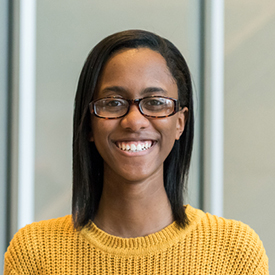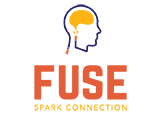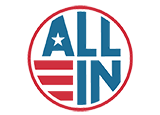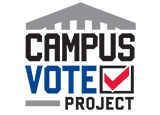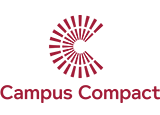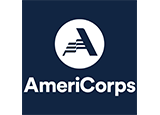2024 Civic Learning and Democratic Engagement Meeting
Learn more.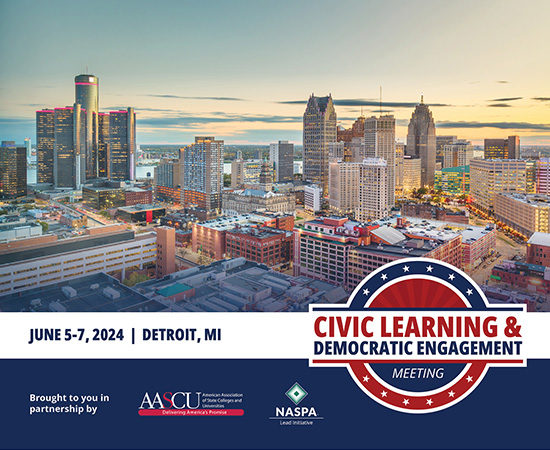
Ensure that graduates are prepared to be the informed, engaged citizens our communities and democracies need.
Our 2024 Civic Learning and Democratic Engagement Meeting (CLDE24) will facilitate exchanges of knowledge and develop a sense of community around our shared civic learning and democratic engagement work. As a community we have adopted the CLDE Theory of Change and strive to create effective strategies and models that strengthen civic learning and democratic engagement.

Who should participate?
- Faculty
- Students
- Senior campus leaders
- Student affairs administrators
- Community partners
How will you benefit?
- Connect with colleagues sharing best practices to incorporate experiential learning opportunities and enact pedagogical and programmatic strategies
- Hear from speakers focused on balancing voter engagement with broader civic engagement
- Discover ways to implement and assess institution-wide civic learning objectives
- Strengthen community and campus integration of civic engagement
- Connect with a community of students, faculty and campus leaders focused on democracy and leadership
Program Highlights
This event convenes a wide range of stakeholders on civic learning and democratic engagement.
Participants will have opportunities to network and develop their civic-minded thinking and practices through plenary sessions, site visits, concurrent sessions, posters, receptions, pre-conference workshops, and working meetings.
schedule at a glance
| 1–4 p.m.
PRE-CONFERENCE SESSIONS |
The Power of Partnering with Election Officials
Working together with your local election officials is a great way to foster partnerships within civic learning and democratic engagement. This session will present a case study of the Michigan Collegiate Student Advisory Task Force where college students serve as liaisons between the Michigan Department of State and their campus populations to advise on department policies and their impact on student voters. Participants will receive strategies and resources to foster and/or strengthen relationships within their own municipalities and states.
|
| Civic Engagement for a New Generation
Most of the civic engagement practices being used today were developed by other generations with a completely different technological and cultural landscape: rallies and marches, phone banking and door knocking, working with institutions like faith organizations. How relevant are these approaches today? In this session, you’ll learn about new innovations in outreach, coalition-building, and engagement. From working with artists and influencers to developing events that bring new, diverse people into movements, this is civic engagement for a new generation.
|
|
| The Role of Students’ Voices in Equity and Democracy in Higher Education
As institutions seek to become more student-centered, a critically important question is how do we incorporate the students’ voices and experiences in higher education. Institutional outcomes and students’ educational experiences can be improved when students’ voices are included throughout the student life cycle and in decision-making. Join us as we explore approaches to capturing and operationalizing students’ voices to strengthen equity and democracy at our institutions.
|
|
| 4:15–6 p.m. | ADP Meeting
|
| 8:30-9:30 a.m. | Building Community for Civic Engagement: Networking for CLDE
|
| 10 a.m.–12 p.m.
SITE VISITS |
The Motown Experience
Learn about the birth of Motown by exploring the original Studio A of Hitsville U.S.A. On this tour, we’ll take a bus to the Motown Museum, located in midtown Detroit, and enjoy a guided tour through one of the epicenters of musical creativity in America in the 1960s. We’ll see instruments, costumes, memorabilia, photos, and gold records from the Supremes, the Temptations, and the Jackson 5, among other artists. Motown helped to usher in significant cultural and social change as a prominent African American-owned label that achieved crossover success thanks to the unique combination of a soul music style with a mainstream pop appeal. |
| Detroit’s Underground Railroad
While the Fugitive Slave Act of 1850 was enforced, formerly enslaved peoples could be captured in the northern United States. Finding a pathway to Canada was critical and Detroit’s strong system of Underground Railroad routes aided formerly enslaved peoples. We will take a bus tour, guided by Jamon Jordan of Black Scroll Network, and explore 10-12 meaningful sites of the secret network of financial, spiritual, and material aid provided to formerly enslaved peoples. Learn Detroit’s code name on the Underground Railroad and learn how over 50,000 people found freedom through their Underground Railroad. |
|
| 1:30-3 p.m. | Opening Plenary Slanted: How an Asian American Troublemaker Took on the Supreme Court
|
| 3:10-4 p.m.
CONCURRENT SESSIONS |
Building Strategic Cross-System Partnerships for Maximum Impact: Public Civics Education for Everyone
|
Pedagogy for Thriving Democracy: ‘Stories are Everything’ and other Civic Maxims
|
|
Fostering Social Mobility through Civic Engagement: An Approach to Decolonizing Higher Education
|
|
Strengthening Democracy through Student-Community Partnerships
|
|
Strengthening On-Campus Partnerships to Increase Civic Engagement Efforts
|
|
Red and Blue: Universities as Agents of Democracy in Polarized States
|
|
College of the Community: Delta Grows Deep Community Roots and National Recognition
|
|
Using Deliberate Dialogue in the Classroom to Foster Social Change
|
|
| 4:10-5 p.m.
CONCURRENT SESSIONS |
Missouri State University’s Voter Education Initiative Cultivates Informed Democratic Engagement
|
Creating Environments for Sustainable Civic Work via an Institutionalization Audit
|
|
National Voter Education Week: Bringing Campuses, Communities Together to Educate New Voters
|
|
Leading through Service: University-Community Partnerships in Urban Schools
|
|
Environmental Impact: A Strategic Guide for Campus & Community Partnerships
|
|
Daring To Diversify: Rhetoric and Strategies in a Post-Affirmative Action World
|
|
Testifying for Civic Futures: We the People In and Beyond the Classroom
|
|
Empowering Students to Create and Lead Policy Issue Forums in the Classroom
|
|
| 5-6:30 p.m. | Opening Reception |
| 5:15-6:30 p.m.
POSTER SESSIONS |
Dialogue ACTS
|
Engaging Student Organizations Through a Co-Curricular Experiential Learning Program
|
|
Combining Environmental Justice & Sustainability Themes with Civic Learning & Democratic Engagement Skill Development
|
|
Involving Candidates in Campus Voter Guides, Town Halls, and Other Nonpartisan Efforts
|
|
Know Our Ballot: MTSU Students Educate Fellow Students About Our Legislators
|
|
A “Feet First” Approach to Political Talk: A Civic Skill
|
|
Arizona Citizens Clean Elections Commission Presents Captain Activate! And The Future Voters
|
|
Student Created, Student Led: The Voter Advocacy Network at RIT
|
|
Unmasking Deception in Voter Engagement– Informed Decision-Making with Nonpartisan Guides
|
|
Integrating GOTV Campaigns with the Curriculum
|
|
Expanding Democratic Participation with Educational Resources that Provide Relatable Civic Learning Experiences
|
|
Big Ten Collaboration Virtual Policy Simulations: Experiential Civic Learning and Dialogue
|
| 7:30-8:20 a.m. | Breakfast |
| 8:30-9:20 a.m.
CONCURRENT SESSIONS |
Civics Literacy and the Purdue Model
|
Building a Campus Climate that Meets the Challenges Facing Higher Education
|
|
Centering Equity: Developing Pathways to Equitable Community Engagement in Higher Education
|
|
Incorporating AI into the Classroom to Boost Civic Learning and Democratic Engagement
|
|
State-Level Voting Laws: Current Policy Landscape and Advocacy Strategies
|
|
Follow the Students’ Lead: Stories from Campus Compact’s Student Design Fellows
|
|
Going Beyond the Walls: Building Sustainable Partnerships to Grow Civic Engagement
|
|
| 9:30-10:20 a.m.
CONCURRENT SESSIONS |
Gaining Academic Leadership Support For Assessing Civic Outcomes Across Degree Programs: Priorities, Programs & Partners
|
RU Running? Political Campaign Training for Undergraduates
|
|
Examining Institutional Responses to the California Student Civic and Voter Empowerment Act
|
|
Integrating Community Engagement and Social Issues in a Preservice Teachers Mathematics Course
|
|
Developing Civic Identities in Pre-Service Elementary Educators
|
|
Educating for the Public Good in California’s Community Colleges Through ‘Civic Dialogues’
|
|
Deliberative Dialogue: How Do We Grapple with Shifting, Outlawed, and Misunderstood Terminology
|
|
AmeriCorps: A Pathway from Service to Success
|
|
| 10:30-11:20 a.m.
CONCURRENT SESSIONS |
Reacting to the Past: A Voice for Marginalized High School Students?
|
Starting Strategically: Assessing Student Civic Knowledge and Skill Incomes at Radford University
|
|
Integrating Political Ideology Diagnostics in your Civic Engagement Work
|
|
State College Civic Engagement: An Exclusive NSLVE Report of AASCU Campuses
|
|
Be HIP: Turn Your Civic Engagement Program into a High-Impact Practice
|
|
Strengthening Civic Literacy: Academic Libraries as Catalysts for Voter Education and Engagement
|
|
Consolidating Engagement: Discovering and Highlighting Commonalities Between Civic and Community Engagement
|
|
Healthy Conversations: Navigating Conflict for Academic and Overall Wellness
|
|
| 11:30 a.m.-1 p.m. | Lunch Break |
| 1-2:30 p.m. | Plenary Session Rethinking Democratic Responsibility through Equitable Access
|
| 3-3:50 p.m.
CONCURRENT SESSIONS |
Supporting Students in Times of Upheaval and Conflict
|
IDEA for Change: Infusing Social Justice into Community/Civic Engagement and Service
|
|
Institutionally Articulating the Higher Purpose: Framing Civic Learning and Community Engagement
|
|
Creative Collaboration: A Coalition Model for Student Voter Engagement
|
|
The Path to Finding and Developing your Civic Footprint
|
|
Engaging History and Building Communities: Digitizing and Digitally Displaying WWII letters
|
|
Civic Empowerment: A Spectrum of Student Engagement and Learning
|
|
At the Intersection of Sports and Civic Engagement
|
|
| 4-4:50 p.m.
CONCURRENT SESSIONS |
Identifying the Academic Learning Outcomes Embedded in Voter Engagement Programming
|
Civic Learning as a General Education Outcome
|
|
Campus Dialogue Programs With Real Impact: Exploring We Are Madison’s Legacy
|
|
Revitalizing and Centering Indigenous Voices
|
|
Deconstructing Silos: State Coalitions Illuminating Civic Possibilities – A Study of MiCivics
|
|
Driving Student Engagement within The New York Times
|
|
Measuring and Employing Student Success Data in Civic Engagement Programming
|
|
| 5:30-6:30 p.m. | Invited Receptions |
| 7:30-9 a.m. | Breakfast |
| 8-9 a.m. | Plenary Session: Countering Threats to Global Democracy
|
| 9:15-10:45 a.m.
CONCURRENT SESSIONS |
Aggies Impact Policy: Strategically Developing a Policy Internship Program
|
Democratic and Election Engagement on Campus: The Presidents Panel
|
|
Infuse Connections through Challenging Conversations: Enhancing Engagement Using the Fuse Card Game
|
|
ZINES! A Fun & Far-Reaching Way to Promote Voter Education & Engagement on Campus
|
|
Building a Movement for Global Civic Engagement through Sustainable Development Goals
|
|
Voices Unbound: Negotiating Free Speech on College Campuses
|
|
Nourishing Democracy: Student-Run Food Pantries, Public Work, and Democratic Culture-Building
|
|
| 11 a.m-12 p.m. | Closing Plenary The Power of Partnerships: Working with State Officials to Increase Student Voter Engagement
|
CLDE 2023 by the numbers
398
Number of attendees who joined us for CLDE 2023.
96%
Attendees who reported learning new information during the conference.
93%
Attendees who felt the information presented during the conference would be immediately applicable to their campus and community work.
Testimonial
Featured speakers
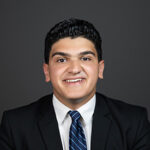
Abdullah
Aljanabi
Democracy Fellow and Michigan Collegiate Student Advisory Task Force Member
Macomb Community College (MI)

Sarah
Anthony
State Senator
Michigan

Jocelyn
Benson
Secretary of State
Michigan

Timothy
Eatman
Dean of the Honors Living-Learning Community
Rutgers University-Newark (NJ)

Ryan
Fewins-Bliss
Executive Director
Michigan College Access Network

Benjamin
Frederick
Associate Vice President of Advocacy and Government Relations
Memorial Healthcare

Brandy
Johnson
President
Michigan Community College Association

Joe X.
Jiang
Co-writer/Guitar/Keys
The Slants

Landon
Myers
Campus Vote Project Michigan Director
Fair Elections Center
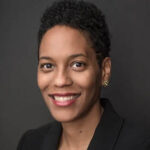
Amelia
Parnell
President
NASPA

Simon
Tam
Author, musician, and self-proclaimed “troublemaker”
The Slants Foundation
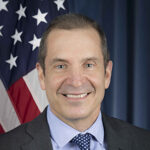
Mark
Toner
Acting Assistant Secretary, Global Public Affairs
U.S. Department of State

Charles L.
Welch
President and CEO
AASCU
Registration Fees
| ATTENDEE TYPE | EARLY BIRD RATE (JAN. 8–MARCH 29) |
REGULAR RATE (MARCH 30–MAY 27) |
LATE (STARTS MAY 28) |
|---|---|---|---|
| INDIVIDUALS | $550 | $625 | $695 |
| STUDENTS* | $380 | $380 | $380 |
| TEAMS** FOUR OR MORE INDIVIDUALS FROM THE SAME INSTITUTION |
$500 per person | $575 per person | Not Available |
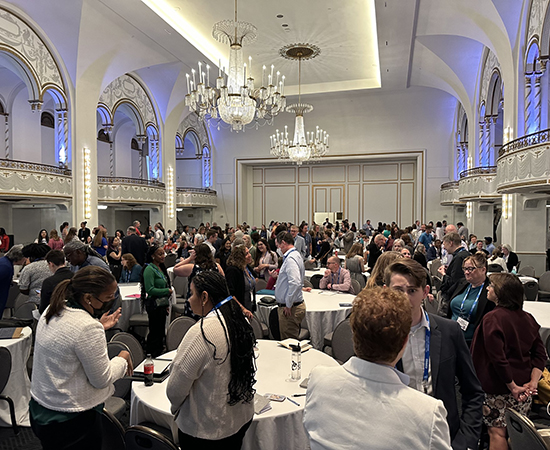
Please note that pre-conference sessions and site visits are optional, each with an additional $50 fee.
Accommodations
Detroit Marriott at the Renaissance Center
400 Renaissance Dr. W
Detroit, MI 48243
(313)568-8000
Room options are available until May 20 at the group rate of $239.00 for single and double occupancy.
AASCU is committed to the health, safety and well-being of all attendees at our gatherings. We follow all local rules and CDC guidance and closely monitor conditions related to COVID-19 and other public health emergencies. Attendees at all AASCU events agree to adhere to the following health and safety protocols.
Before leaving home
- AASCU strongly encourages all participants to be fully vaccinated. The CDC Vaccines website provides definitions of “Fully Vaccinated” and “Up To Date”.
- Stay home if you feel unwell or have any COVID-19 symptoms or test positive for COVID-19. We recommend attendees wear masks while traveling to and from the event and follow COVID-19 safety practices in the days leading up to the event.
- We strongly encourage attendees to take a rapid antigen COVID-19 test before traveling and before arriving to AASCU convenings.
Onsite during the event
- Masks are recommended and will be available at the registration desk.
- If you are experiencing cold or COVID-19 symptoms please be respectful and wear a mask.
- Self-administered COVID-19 rapid antigen tests will be available at the registration desk. We encourage participants test themselves upon arrival before joining the conference.
- Wash hands often with soap and water for at least 20 seconds, or use an alcohol-based sanitizer with at least 60% alcohol
- Avoid touching eyes, nose, and mouth with unwashed hands
- Cover your nose and mouth when coughing or sneezing. Throw used tissues in the trash.
- Clean and disinfect frequently touched objects and surfaces using a regular household cleaning spray or wipes.
- If you feel unwell, develop symptoms of COVID-19, or test positive for COVID-19 at any time during the convening, seek medical care and do not attend the meals or gatherings.
- If you test positive during the conference, please notify AASCU staff by emailing meetings@aascu.org.
AASCU reserves the right to modify these policies and procedures at any time given the rapidly changing nature of any current and ongoing public health emergencies.
All meetings and conferences sponsored by AASCU are inclusive and accessible to all individuals, including individuals with disabilities. Please request accessibility services when you register and contact us if you need auxiliary aids or services.
By participating in an AASCU conference, you are automatically authorizing AASCU and its employees and its Communications department to use your name, photograph, voice, or another likeness for purposes related to the mission of AASCU, including but not limited to publicity, marketing, websites, social media vehicles, and any other AASCU-related electronic forms or media for the promotion of AASCU and its various programs.
Please complete the form at the bottom of this page to inquire about partnership opportunities for this event. Click here to see partners already committed to supporting this convening.
More information on engagement opportunities.